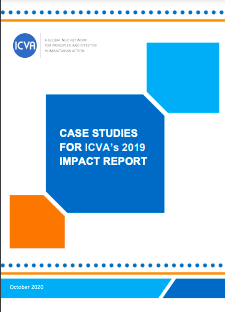Case studies 2019 – 2021

5 case studies showing the diversity of ICVA’s ways of working globally and regionally were included in the 2019-2020 mid stratetgy impact study report.
- Case Study 1 • In its advocacy for the Sahel Region, understanding was grounded through its regular engagement with HCs and NGOs in the region.
- Case Study 2 • ICVA enabled the inclusion and participation of local and national NGOs in IASC coordination structures, notably the Operational Policy and Advocacy Group (OPAG) and Results Groups (RGs), for the first time after years of advocating for inclusion of national NGOs in the IASC architecture.
- Case Study 3 • ICVA helped improve NGO understanding of the “8 + 3 Template” by engaging local NGOs and field colleagues about the approach and the implications of the template during the pilot process in Iraq, Myanmar, and Somalia.
- Case Study 4 • ICVA’s increased engagement in China to facilitate a more diverse and inclusive approach to coordination and has helped to expand the role of Chinese NGOs in international forums and coordination mechanisms.
- Case Study 5 • Throughout 2020, ICVA worked to support members adjust to the substantial operational and financial challenges created by the pandemic. ICVA was able to do this by successfully integrating Covid-19 response activities into its current strategic focus areas and the ways of working (such as through engagement in the IASC mechanisms).
4 case studies were included in the 2019-2021 impact study report.
- Case Study 1: Throughout 2020 and 2021, ICVA contributed greatly to the work of the High Level Panel (HLP) on Internal Displacement through civil society engagement and playing a catalysing role regarding joining messages which focused in particular on the following subjects addressed in the HLP report and its recommendations.
- Case Study 2: ICVA and our members and CSO partners joined together in a call to States and their leaders to take action through an Open Letter on famine prevention.
- Case Study 3: ICVA was a core part of the process in developing the Climate Charter and bringing together ICVA members to shape the Charter and mobilising them to sign the Charter.
- Case Study 4: In a collaboration with UNDP Syria and the local Syrian Network League (SNL), ICVA worked closely with the heads of the Syrian NGO Networks to strengthening their existing capacity on a set of required skills related to collective advocacy, representation, and strategic planning.
-
2019 Case study - Advocacy for Sahel region
(English)
-
2019 Case study- South-south engagement China cooperation
(English)
-
2019 Case study - 8+1 narrative reporting template
(English)
-
2020 Case study - Covid 19 Response
(English)
-
2019 case study - Engaging IASC mechanisms
(English)
-
2021 case study - The High Level Panel on Internal Displacement and ICVA’s Contribution to its Work
(English)
-
2021 case study - Collective Advocacy on Famine Prevention – ICVA Open Letter
(English)
-
2021 case study - Climate Charter
(English)
-
2021 case study - “The Evolution of Syrian NGO Networks: Their Role In Humanitarian Response and Long-Term Prospects”
(English)
-
2019 - 2021 Impact Study Report
(English)






